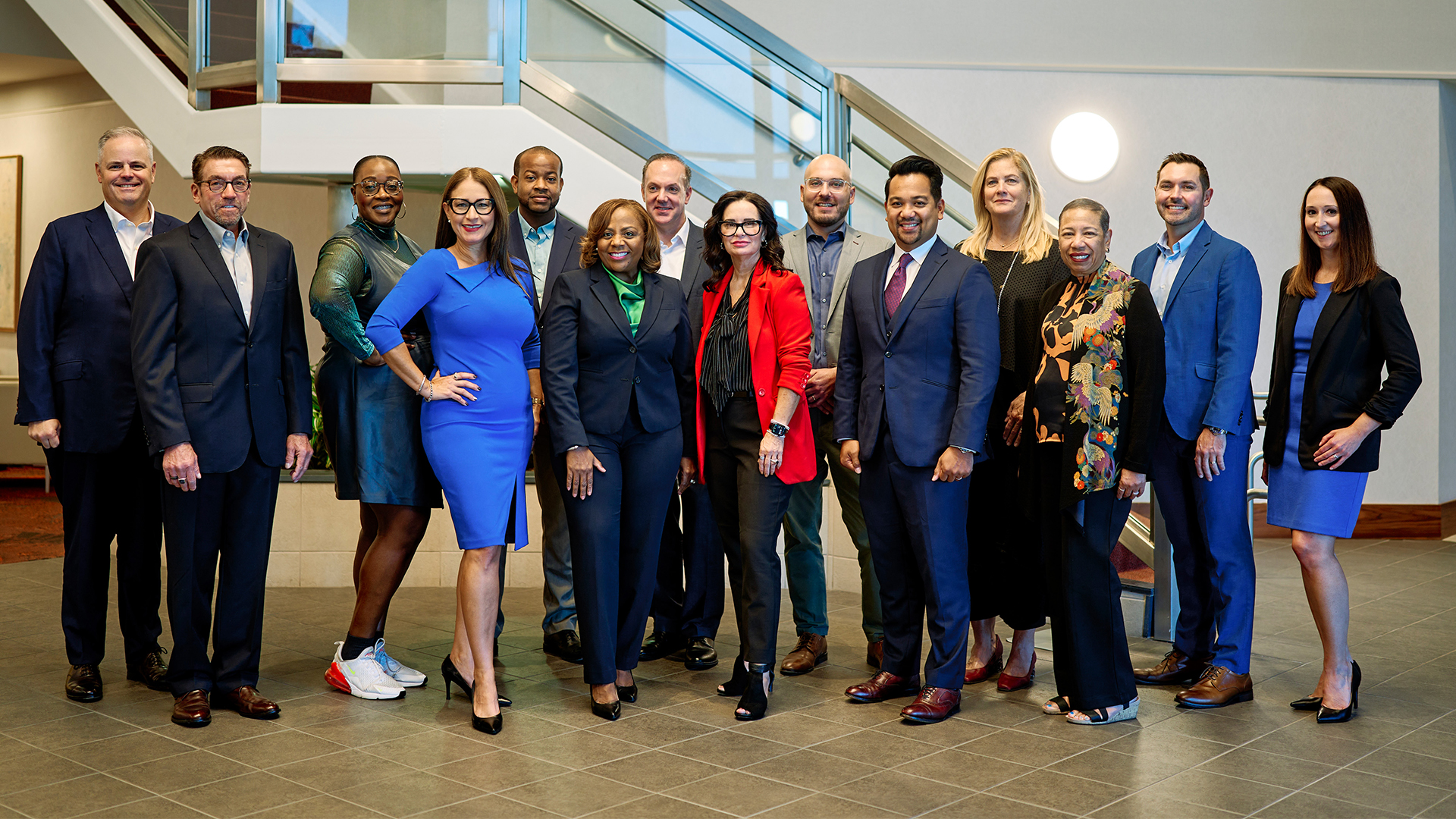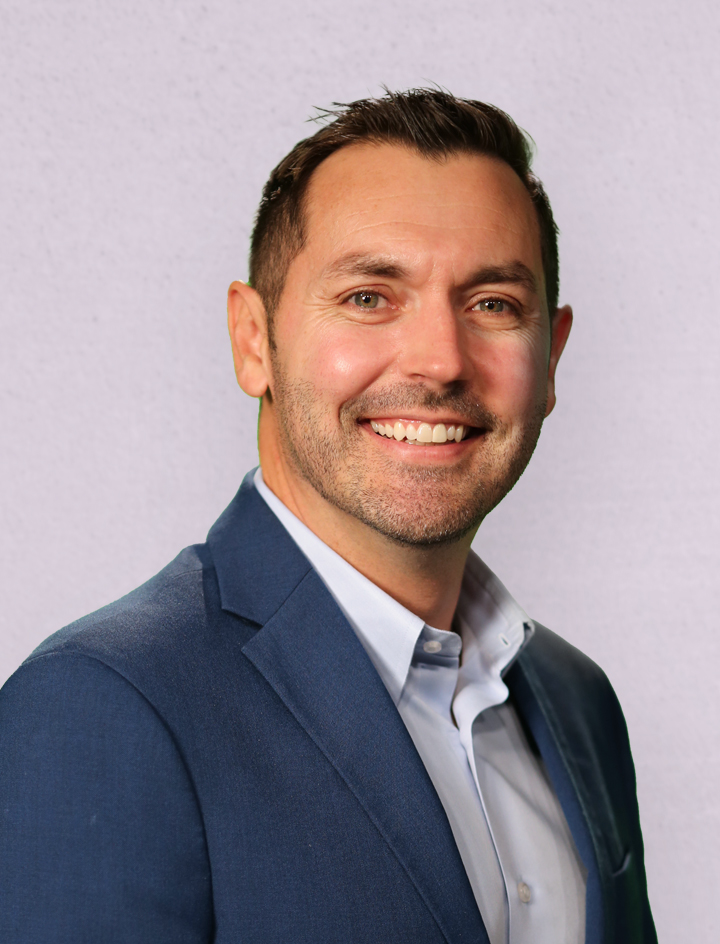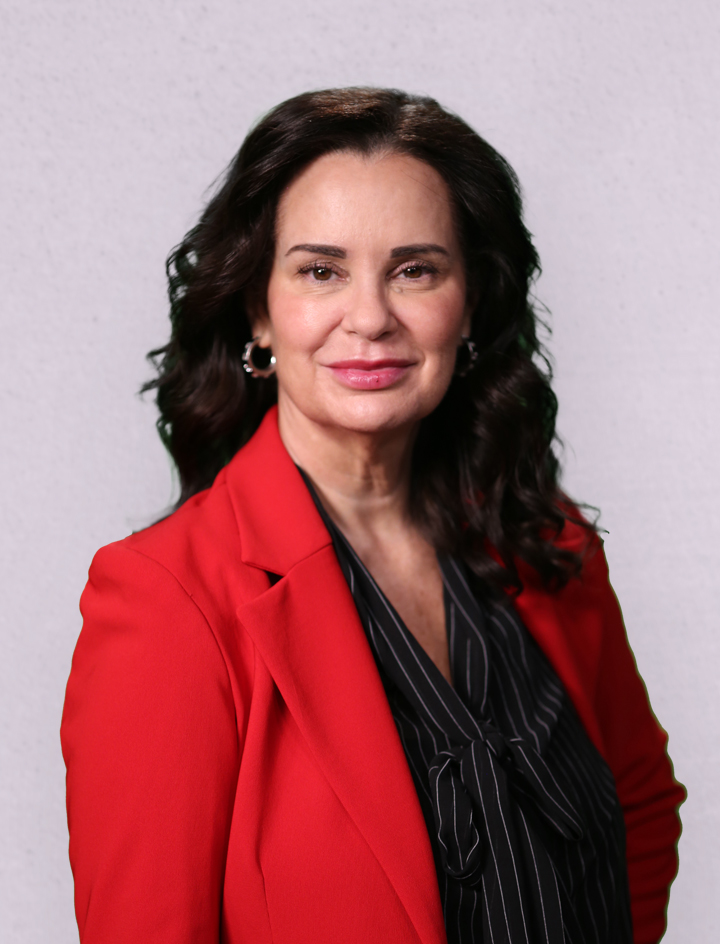Author
Subscribe to Newsletter
Related Posts
FinServe Summit
FinServe Network Convenes for 2024 Summit

The 2024 FinServe Summit opened with a presentation from Jared Trexler, chief marketing and strategy officer, to the 13 ambassadors present – including several new members. Trexler covered the latest developments and initiatives from The College, from upcoming events like the Horizons 2025 conference to new programming like the Tax Planning Certified Professional™ (TPCP™) Program, and more.
Following Trexler’s presentation, Senior Vice President of Advancement and Alumni Relations Carol Parlin Prushan discussed philanthropic giving and some of the advancement and alumni relations team’s ongoing work to engage The College’s students and alumni.
“We’re like the filter for our clients,” said Ande Frazier, CFP®, CLU®, ChFC®, RICP®, BFA™, ChSNC®, CDFA®, CEPA, CExP, one of 2024’s new recruits to the FinServe Network. “We need to get them information that is true, real, and important to them – and which reflects their values.”
Ambassadors present at the 2024 Summit came from across the country, including such locations as Alaska and Puerto Rico.
Practice Management and Personal Growth
The first day of the Summit ended with special guest Marc Butler, an author, entrepreneur, and financial advisor, speaking to the ambassadors about how to organically grow an advisory practice, as well as the obstacles independent wealth management firms face in technology, talent acquisition, business development, leadership, and operations.
“Many businesses and professionals have ideas, but many don’t have a strategic plan,” Butler said. “Having that plan is critical because that’s what really brings a team together.”
“Many businesses and professionals have ideas, but many don’t have a strategic plan. Having that plan is critical because that’s what really brings a team together.”
—Marc Butler
Butler also discussed potential uses of artificial intelligence (AI) systems to reduce demands on advisors’ time, as well as the importance of a practice’s vision, mission, and core values as a value proposition to clients – especially in the critical focus area of retirement planning.
Strengthening the Foundations of Financial Services
In keeping with tradition, the second day of the FinServe Summit began with an early morning conversation over coffee and breakfast with George Nichols III, CAP®, College president and CEO.
In his talk with the ambassadors, Nichols highlighted the differences between the financial services “industry” and “profession,” including the duty of financial professionals to benefit society as well as influence the direction of the industry for the better. He especially called attention to the subject of recruitment and retention in the field, saying The College is dedicated to addressing both areas, but that in some cases, retention has become the more pressing concern.
“The fact is 72% of people who start in this business leave after only a few years,” Nichols said, citing research from Cerulli. “A lot of the time we focus on the diversity of the industry and bringing more people of color, women, and others on board – but if we don’t fix this retention problem, we’re still failing them, and we’re failing white men, too.”
After the conversation with The College president, members of The College’s marketing and communications team led a workshop on social media usage and content creation for the ambassadors. They were welcomed into brainstorming sessions for future College content and various video clips and segments to use in their own personal branding and for The College’s marketing efforts.
“72% of people who start in this business leave after only a few years…if we don’t fix this retention problem, we’re still failing [diverse professionals], and we’re failing white men, too.”
—George Nichols III, CAP®
Further activities included individual interviews with new ambassadors, as well as group panel discussions on some of The College’s most important areas of focus: financial products and planning strategies for retirement; philanthropy and donor-advised funds (DAFs) for giving; tax and small business planning; and the future of specialized knowledge in the financial services industry. Associate Professor of Business Planning Sophia Duffy, JD, CPA, AEP® and ThinkAdvisor senior reporter John Manganaro joined President Nichols in hosting those panel discussions.
After the individual and group sessions were concluded, Trexler reconvened the ambassadors for a final thank-you and farewell.
“We’re incredibly lucky to have you all on our team,” he said. “You are the people who will help carry our mission forward.”
More From The College
- Learn more about the FinServe Network
- Meet the New FinServe Network Ambassadors
Professional Credentials and Financial Literacy

In their recent paper, “Assessing Retirement Income Literacy of Consumers and Financial Advisors: What Is the Value of Financial Professional Designations?,” Eric Ludwig, PhD, Certified Financial Planner® (CFP®) and Chet Bennetts CFP, Chartered Financial Consultant® (ChFC®), Chartered Life Underwriter® (CLU®), Retirement Income Certified Professional® (RICP®), analyze the results of The College’s recent Retirement Income Literacy Study (RILS) and the impact professional designations have on financial advisors’ retirement income literacy.
Why Does Retirement Income Literacy Matter?
Ludwig and Bennetts begin their argument by explaining the need for retirement income literacy, both among Americans in general and specifically among financial advisors. They point to a shift in responsibilities, as individuals are shouldering a greater burden for planning their retirement than they have in past generations. This trend suggests that individuals who wish to retire comfortably and attain all their financial goals will need either some level of retirement income literacy themselves or advice from someone else with significant retirement income literacy.
As for financial advisors, their field covers a variety of topics. According to Ludwig and Bennetts, “Each of these areas requires specialized knowledge, similar to other professions where expertise is essential to effective practice. However, unlike fields such as medicine or law, where specific credentials are mandatory, the financial planning industry allows for more variability in professional qualifications. This situation raises important questions about the role of voluntary credentials in signaling expertise and their relationship to actual competence in critical areas such as retirement income planning.”
"...unlike fields such as medicine or law, where specific credentials are mandatory, the financial planning industry allows for more variability in professional qualifications. This situation raises important questions about the role of voluntary credentials in signaling expertise and their relationship to actual competence in critical areas such as retirement income planning.”
Ludwig and Bennetts draw upon two theoretical perspectives to formulate a hypothesis regarding the importance of designations among financial advisors. The first is Signaling Theory, which, in the context of financial planning, suggests that advisors can set themselves apart from competitors through professional designations. Ludwig and Bennets state, “designations serve as signals of an advisor's competence and commitment to their field.”
The other theory the duo draws upon is known as the Human Capital Theory. This theory contends, “that individuals can increase their productivity and earnings through investments in education, training, and other forms of knowledge acquisition.” By pairing these two theories together, Ludwig and Bennetts propose that designations not only signal a higher level of competency, they “correlate with actual increases in relevant knowledge and competence.”
Analyzing Trends
To support this assertion, Ludwig and Bennetts turn to the RILS for more information. “[The Retirement Income Literacy Scale] used in this survey consists of 38 questions covering 11 domains of retirement income planning. These domains include life expectancy, Social Security, life insurance, annuities, taxes, inflation, housing, Medicare, long-term care, investments, and retirement plans.”
In analyzing these results, several trends emerge. Consistently, Americans have answered correctly on 31% of responses. However, several demographics tend to affect these scores:
- Men tend to score higher than women
- Individuals with higher net worth tend to score higher than individuals with a lower net worth
- Individuals who work with a financial advisor tend to score higher than those who do not
As Ludwig and Bennetts suggest, “both individual characteristics and professional financial guidance may play a role in retirement income literacy.”
Financial professionals who participated in the study were found to score well. As Ludwig and Bennetts analyze the data, they also point out that, “Those with professional designations scored notably higher (87%) compared to those without designations (78%).” This marked difference between advisors with professional designations and advisors without professional designations indicates a statistically significant positive impact of professional designations, even among individuals who score several times better than the average American.
As they continue their analysis of the findings, Ludwig and Bennetts review the impact of multiple designations on a financial professional’s retirement income literacy. According to their findings, multiple designations do correlate to increased retirement income literacy, dropping off in statistical significance at the fourth designation.
As for specific designations, four emerged as significant predictors of increased RILS scores, including the CFP®, RICP®, ChFC®, and CLU®.
Based on these findings, Ludwig and Bennetts assert that, “Financial advisors with designations … demonstrated substantially higher retirement income literacy compared to those without designations.”
Impact
For financial advisors, these results point towards the importance of pursuing professional designations. These designations not only suggest increased competency to potential clients, they act as real indicators of increased competency.
Advisory firms may also consider taking action on these findings. Without a consistent standard for additional education in the industry, firms that want to establish themselves as credible sources of retirement planning advice could consider supporting advisors in their pursuit of the four designations studied:
- CFP® Certification Education
- Chartered Financial Consultant® (ChFC®)
- Chartered Life Underwriter® (CLU®)
- Retirement Income Certified Professional® (RICP®)
As for clients, Ludwig and Bennetts state, “these findings emphasize the importance of working with designated financial professionals, particularly when seeking retirement planning advice. The higher RILS scores among designated professionals suggest that these advisors are better equipped to navigate the complexities of retirement income planning, potentially leading to more effective strategies and better retirement outcomes for clients.”
Overall, the findings as presented by Ludwig and Bennetts point to the importance of designations for clients, advisors, and firms. They close by stating that, “By investing in relevant designations and continually enhancing their knowledge, financial advisors can better serve their clients and contribute to improved retirement outcomes in an increasingly complex financial landscape.” Ultimately, all parties involved benefit from specialized financial knowledge.
More From The College:
- Learn about the American College Center for Retirement Income.
- Learn about the retirement planning conference, Horizons.

Ryan Swenson
RICP®

Ande Frazier
CFP®, CLU®, ChFC®, RICP®, BFA™, ChSNC®, CDFA®, CEPA, CExP
Author
Subscribe to Newsletter
Related Posts
INDUSTRY EVENT: Ed Slott’s Elite IRA Advisor Group Workshop
Author
Subscribe to Newsletter
Related Posts
INDUSTRY EVENT: NAEPC Advanced Estate Planning Strategies Conference
Diversity, Equity & Inclusion Insights
Thank You From Our Scholars

Dear The American College of Financial Services Center for Military and Veterans Affairs,
I wanted to express my sincere appreciation for awarding me a scholarship that will allow me to pursue my goals of becoming a financial advisor when I retire from the military. It is hard to put into words how I feel at this moment, because I have been looking forward to this for a long time and the opportunities that this scholarship will afford me are endless. So many people go into debt to achieve their dreams, but thanks to your generosity, I won’t have to do that. Rest assured that I will pay it forward once I have completed the coursework and begin my journey as a financial advisor. Thank you so much for all that you do and continue to do. You guys are truly amazing!
Very Respectfully,
Jeremiah Jares
Diversity, Equity & Inclusion Insights
MRG Consortium Meeting and Participation MRG Networking Lounge

On June 25th, numerous members of the MRG Consortium met for their first virtual quarterly meeting to discuss the group’s first initiative: barriers military members face transitioning into financial services. The group identified several barriers, including:
- Awareness
- Informing the military community there is a path into the industry with their skills and companies are interested in hiring them
- Timing
- The time it takes to complete a certification program, timing of their transition and having information ahead of transitioning
- Pathways
- There is not one defined path in this industry, there are many paths an individual can take
- Affordability
- Finding the funding for their education
Various MRGs detailed how they are helping members of the community overcome these barriers, including a mentorship program, working with local bases, and talking with those in transition about financial awareness and wellbeing and what is required to be hired and enter the industry. They also discussed utilizing SkillBridge, a Department of Defense (DoD) program that helps service members gain civilian work experience before they leave active duty.
Following the virtual meeting, the consortium had the opportunity to meet in person during the inaugural Military Resource Group Networking Lounge at The College’s 2024 Military Summit. Various companies including F&G, Nationwide, NFP, Thrivent, and USAA were able to network amongst one another, meet with Military Center scholars in attendance, and have a special meet-and-greet with the 2024 Soldier-Citizen Award recipient.
Diversity, Equity & Inclusion Insights
AFSA 2024 Convention Symposium

Attending for the first time, the Center for Military and Veterans Affairs was one of numerous exhibitors from various industries present to inform the military community of education and professional development opportunities.
AFSA is a federally chartered Veterans’ Service Organization with a vision to be the premier professional military and veterans service organization of choice for the enlisted corps and their families.
Throughout the conference, the Center had the opportunity to speak with numerous active duty and retired service members, as well as veterans and spouses, of the Air Force, Space Force, Air National Guard, and Air Force Reserve Command about the educational and professional opportunities the Center and The American College of Financial Services has to offer those in transition out of the military and into civilian life and those interested in a career in the Financial Services Industry.